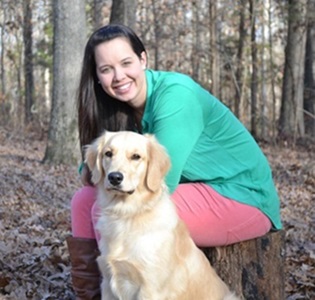Your family has just gone through a traumatic experience. Your son or daughter is recovering from an accident or sickness and needs weeks or months of therapy before they're ready to go home. You may even be in a new city, trying to familiarize yourself with your new surroundings. It’s a lot to handle. You miss your home, your bed, your pets, your old life. It sure would be nice to see a wagging tail and cuddle with something soft for a moment.
And then, in walks Maggie, the 5-year-old Golden Retriever – cool as a cucumber on the outside but inside, you know she just wants a good petting and you’re happy to oblige. Instantly, your sprits are lifted, you feel the gravity of past heavy moments fade away. Your child perks up and suddenly, all eyes are on this new wagging, smiling, red ball of fur. For the time being, you forget you’re in a hospital. You remember your life outside of this. You have hope that you’ll soon be back there.
“Sometimes just her presence can have an influence. Often when you’re petting her, you’re not thinking about petting her. Your body is going through that calming repetition,” says Christina Hall, a pediatric physical therapist and Maggie’s owner. “It’s that calming relaxation of rubbing soft fur – it’s getting your mind off of what’s going on.”
These types of moments happen nearly every day on Levine Children’s Hospital's Pediatric Rehabilitation floor. Inpatient pediatric patients – some who have transferred to the hospital hours away from home – and their families settle in for the next step of their recovery – sometimes the one that may be the longest before they’re ready to go home.
So any moment that may be able to help patients and their families feel hope and joy and remember that the doctors, nurses, therapists and staff – they’re all there to support them on this journey – that can go a long way in the healing process.
An Unbreakable Bond
For Hall, she gets to see these transformations happen all the time. She knows the power that an animal has – she grew up around horses and dogs – especially in their bond with humans. And time again, research has proven the calming and anxiety-reducing qualities that a dog can provide. So when the unit’s previous therapy dog left with her owner several years ago, there was a noticeable presence missing from floor.
She volunteered to revive the program and began her own journey with Maggie, who she got as an 8-week-old puppy. Over the next 10 months, she started training the pup, and just after her first birthday, she passed her pet therapy certification exam. Ever since, she has been a regular on the fourth floor – every Tuesday and Friday.
Part Work, Part Fun
Maggie’s role is multidimensional. She’s part sensory object, part fetch partner and part patient motivators as well as being leaned on for emotional and psychological support. Hall and Maggie have made quite the team – knowing when to push patients during a motor therapy session, and when to back off for minimally conscious patients. She works both 1 on 1 with patients and in group settings.
Her most admirable feature may be her demeanor. Golden Retrievers – and similar breeds like Golden Doodles and Labradoodles – are naturally mild-mannered and people pleaser dogs. As part of her training, Maggie had to be OK with the sights, sounds and smells of a hospital – beeping machines, patients using walkers, wheelchairs and other medical equipment and a steady influx of stimulation.
“You don’t want (therapy dogs) to be too timid and you don’t want them to be too forward either,” Hall says. “Luckily, Maggie loves to be petted, that’s all she wants.”
Every day at lunch, Maggie gets to go outside for her break and when she’s not visiting patients, she makes herself at home right under Hall’s desk. Some days other visitation dogs come to make the rounds in the pediatric rehabilitation unit and Maggie gets to say hello. Hall loves her job every day but when she breaks out the leash on Tuesday and Friday mornings, Maggie knows exactly where she's going and can't wait to get to her job.
“Not a lot of people get to bring their dog to work,” Hall says. “I’m very lucky.”



